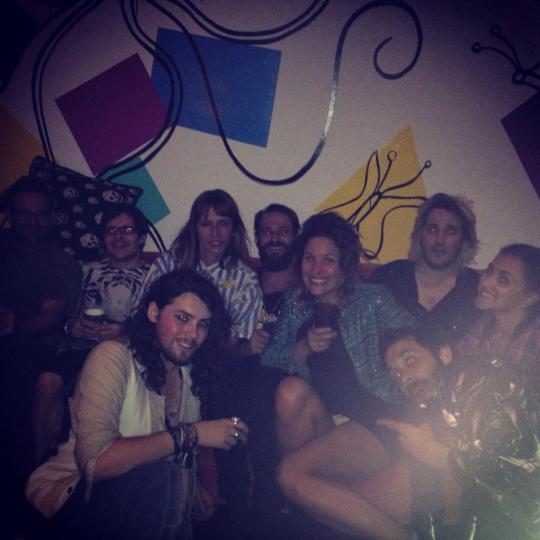#Lliana Bird
Text
Noel and Birdy at The Royal Television Society awards. Noel was nominated for best entertainment performance with Alison Hammond for Bake off.
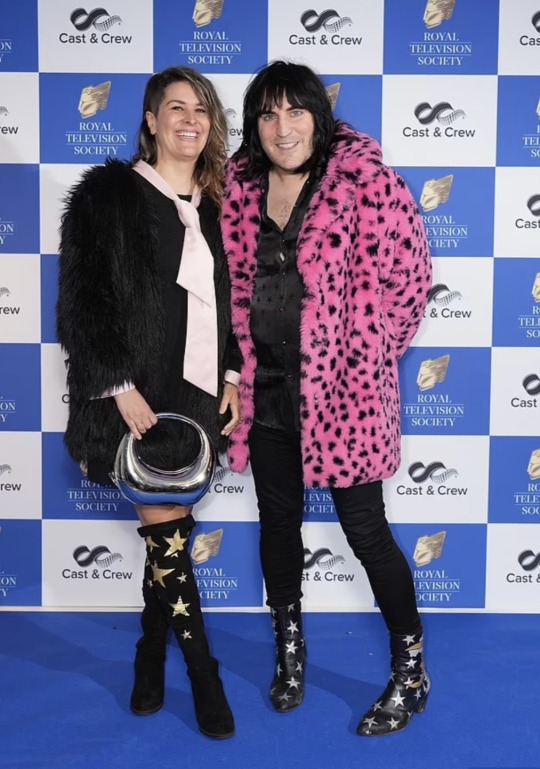
35 notes
·
View notes
Text

Source Is Here
59 notes
·
View notes
Text
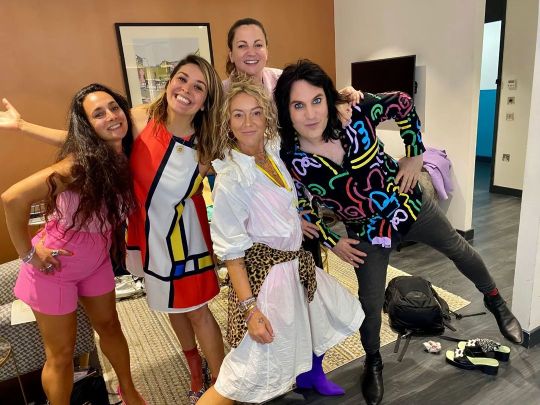

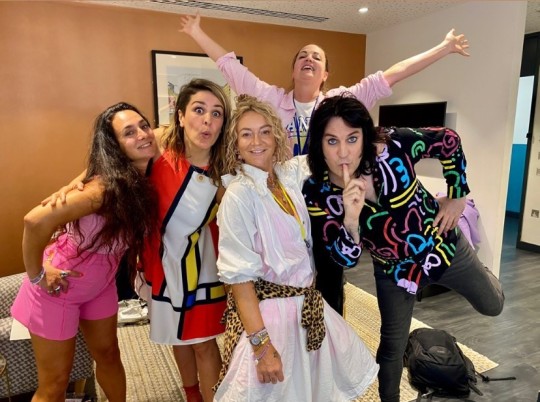

Photos by Rachel Moule and by Lucie Speciale
51 notes
·
View notes
Photo
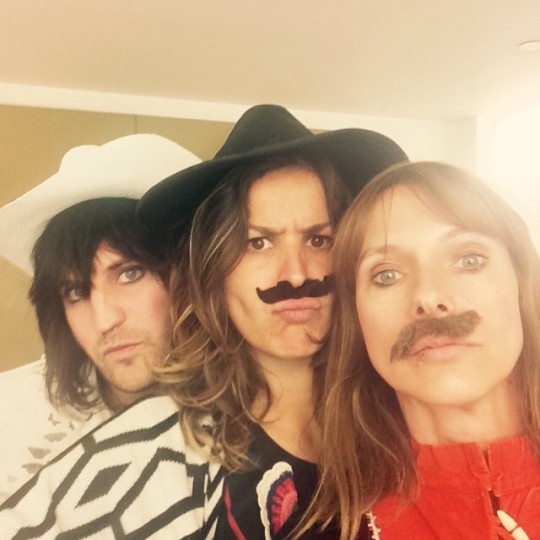
[x]
Three Beauties x
#Noel Fielding#Noeledit#Lliana Bird#Noeliana#Dolly Wells#People#Photos#Beautiful People#Beautiful Photos#HD Photos#Stylish Photos#Fashion People#British People#British Comedy#British Comedians#British TV#British TV Shows#British Celebrities#Celebrities#Selfie#Instagram
21 notes
·
View notes
Text

birdy’s ig story ❤️
23 notes
·
View notes
Text
Noel: Do you ever just see something that changes your life and you're just...huh?
Julian: I saw you.
Noel: Honestly, that's so gay and sweet, and it really makes this awkward, because I was gonna show you this drawing of Birdy as a turkey
#noel fielding#boosh#mighty boosh#the mighty boosh#julian barratt#noelian#lliana bird#noelliana#noeliana#incorrect boosh
3 notes
·
View notes
Text
CHAPTER XVI A SUBMARINE FOREST
We had at last arrived on the borders of this forest, doubtless one of the finest of Captain Nemo’s immense domains. He looked upon it as his own, and considered he had the same right over it that the first men had in the first days of the world. And, indeed, who would have disputed with him the possession of this submarine property? What other hardier pioneer would come, hatchet in hand, to cut down the dark copses?
This forest was composed of large tree-plants; and the moment we penetrated under its vast arcades, I was struck by the singular position of their branches—a position I had not yet observed.
Not a herb which carpeted the ground, not a branch which clothed the trees, was either broken or bent, nor did they extend horizontally; all stretched up to the surface of the ocean. Not a filament, not a ribbon, however thin they might be, but kept as straight as a rod of iron. The fuci and llianas grew in rigid perpendicular lines, due to the density of the element which had produced them. Motionless, yet when bent to one side by the hand, they directly resumed their former position. Truly it was the region of perpendicularity!
I soon accustomed myself to this fantastic position, as well as to the comparative darkness which surrounded us. The soil of the forest seemed covered with sharp blocks, difficult to avoid. The submarine flora struck me as being very perfect, and richer even than it would have been in the arctic or tropical zones, where these productions are not so plentiful. But for some minutes I involuntarily confounded the genera, taking zoophytes for hydrophytes, animals for plants; and who would not have been mistaken? The fauna and the flora are too closely allied in this submarine world.
These plants are self-propagated, and the principle of their existence is in the water, which upholds and nourishes them. The greater number, instead of leaves, shot forth blades of capricious shapes, comprised within a scale of colours,—pink, carmine, green, olive, fawn, and brown. I saw there (but not dried up, as our specimens of the Nautilus are) pavonari spread like a fan, as if to catch the breeze; scarlet ceramies, whose laminaries extended their edible shoots of fern-shaped nereocysti, which grow to a height of fifteen feet; clusters of acetabuli, whose stems increase in size upwards; and numbers of other marine plants, all devoid of flowers!
“Curious anomaly, fantastic element!” said an ingenious naturalist, “in which the animal kingdom blossoms, and the vegetable does not!”
Under these numerous shrubs (as large as trees of the temperate zone), and under their damp shadow, were massed together real bushes of living flowers, hedges of zoophytes, on which blossomed some zebrameandrines, with crooked grooves, some yellow caryophylliæ; and, to complete the allusion, the fish-flies flew from branch to branch like a swarm of humming-birds, whilst yellow lepisacomthi, with bristling jaws, dactylopteri, and monocentrides rose at our feet like a flight of snipes.
In about an hour Captain Nemo gave the signal to halt. I, for my part, was not sorry, and we stretched ourselves under an arbour of alariæ, the long thin blades of which stood up like arrows.
This short rest seemed delicious to me; there was nothing wanting but the charm of conversation; but, impossible to speak, impossible to answer, I only put my great copper head to Conseil’s. I saw the worthy fellow’s eyes glistening with delight, and to show his satisfaction, he shook himself in his breastplate of air in the most comical way in the world.
After four hours of this walking I was surprised not to find myself dreadfully hungry. How to account for this state of the stomach I could not tell. But instead I felt an insurmountable desire to sleep, which happens to all divers. And my eyes soon closed behind the thick glasses, and I fell into a heavy slumber, which the movement alone had prevented before. Captain Nemo and his robust companion, stretched in the clear crystal, set us the example.
How long I remained buried in this drowsiness I cannot judge; but, when I woke, the sun seemed sinking towards the horizon. Captain Nemo had already risen, and I was beginning to stretch my limbs, when an unexpected apparition brought me briskly to my feet.
A few steps off, a monstrous sea-spider, about thirty-eight inches high, was watching me with squinting eyes, ready to spring upon me. Though my diver’s dress was thick enough to defend me from the bite of this animal, I could not help shuddering with horror. Conseil and the sailor of the Nautilus awoke at this moment. Captain Nemo pointed out the hideous crustacean, which a blow from the butt end of the gun knocked over, and I saw the horrible claws of the monster writhe in terrible convulsions. This accident reminded me that other animals more to be feared might haunt these obscure depths, against whose attacks my diving-dress would not protect me. I had never thought of it before, but I now resolved to be upon my guard. Indeed, I thought that this halt would mark the termination of our walk; but I was mistaken, for, instead of returning to the Nautilus, Captain Nemo continued his bold excursion. The ground was still on the incline, its declivity seemed to be getting greater, and to be leading us to greater depths. It must have been about three o’clock when we reached a narrow valley, between high perpendicular walls, situated about seventy-five fathoms deep. Thanks to the perfection of our apparatus, we were forty-five fathoms below the limit which nature seems to have imposed on man as to his submarine excursions.
I say seventy-five fathoms, though I had no instrument by which to judge the distance. But I knew that even in the clearest waters the solar rays could not penetrate further. And accordingly the darkness deepened. At ten paces not an object was visible. I was groping my way, when I suddenly saw a brilliant white light. Captain Nemo had just put his electric apparatus into use; his companion did the same, and Conseil and I followed their example. By turning a screw I established a communication between the wire and the spiral glass, and the sea, lit by our four lanterns, was illuminated for a circle of thirty-six yards.
Captain Nemo was still plunging into the dark depths of the forest, whose trees were getting scarcer at every step. I noticed that vegetable life disappeared sooner than animal life. The medusæ had already abandoned the arid soil, from which a great number of animals, zoophytes, articulata, molluscs, and fishes, still obtained sustenance.
As we walked I, thought the light of our Ruhmkorff apparatus could not fail to draw some inhabitant from its dark couch. But if they did approach us, they at least kept at a respectful distance from the hunters. Several times I saw Captain Nemo stop, put his gun to his shoulder, and after some moments drop it and walk on. At last, after about four hours, this marvellous excursion came to an end. A wall of superb rocks, in an imposing mass, rose before us, a heap of gigantic blocks, an enormous, steep granite shore, forming dark grottos, but which presented no practicable slope; it was the prop of the Island of Crespo. It was the earth! Captain Nemo stopped suddenly. A gesture of his brought us all to a halt, and, however desirous I might be to scale the wall, I was obliged to stop. Here ended Captain Nemo’s domains. And he would not go beyond them. Further on was a portion of the globe he might not trample upon.
The return began. Captain Nemo had returned to the head of his little band, directing their course without hesitation. I thought we were not following the same road to return to the Nautilus. The new road was very steep, and consequently very painful. We approached the surface of the sea rapidly. But this return to the upper strata was not so sudden as to cause relief from the pressure too rapidly, which might have produced serious disorder in our organisation, and brought on internal lesions, so fatal to divers. Very soon light reappeared and grew, and the sun being low on the horizon, the refraction edged the different objects with a spectral ring. At ten yards and a half deep, we walked amidst a shoal of little fishes of all kinds, more numerous than the birds of the air, and also more agile; but no aquatic game worthy of a shot had as yet met our gaze, when at that moment I saw the Captain shoulder his gun quickly, and follow a moving object into the shrubs. He fired;—I heard a slight hissing, and a creature fell stunned at some distance from us. It was a magnificent sea-otter, an enhydrus, the only exclusively marine quadruped. This otter was five feet long, and must have been very valuable. Its skin, chestnut-brown above and silvery underneath, would have made one of those beautiful furs so sought after in the Russian and Chinese markets; the fineness and the lustre of its coat would certainly fetch £80. I admired this curious mammal, with its rounded head ornamented with short ears, its round eyes, and white whiskers like those of a cat, with webbed feet and nails, and tufted tail. This precious animal, hunted and tracked by fishermen, has now become very rare, and taken refuge chiefly in the northern parts of the Pacific, or probably its race would soon become extinct.
Captain Nemo’s companion took the beast, threw it over his shoulder, and we continued our journey. For one hour a plain of sand lay stretched before us. Sometimes it rose to within two yards and some inches of the surface of the water. I then saw our image clearly reflected, drawn inversely, and above us appeared an identical group reflecting our movements and our actions; in a word, like us in every point, except that they walked with their heads downward and their feet in the air.
Another effect I noticed, which was the passage of thick clouds which formed and vanished rapidly; but on reflection I understood that these seeming clouds were due to the varying thickness of the reeds at the bottom, and I could even see the fleecy foam which their broken tops multiplied on the water, and the shadows of large birds passing above our heads, whose rapid flight I could discern on the surface of the sea.
On this occasion, I was witness to one of the finest gun-shots which ever made the nerves of a hunter thrill. A large bird of great breadth of wing, clearly visible, approached, hovering over us. Captain Nemo’s companion shouldered his gun and fired, when it was only a few yards above the waves. The creature fell stunned, and the force of its fall brought it within the reach of dexterous hunter’s grasp. It was an albatross of the finest kind.
Our march had not been interrupted by this incident. For two hours we followed these sandy plains, then fields of algæ very disagreeable to cross. Candidly, I could do no more when I saw a glimmer of light, which, for a half mile, broke the darkness of the waters. It was the lantern of the Nautilus. Before twenty minutes were over we should be on board, and I should be able to breathe with ease, for it seemed that my reservoir supplied air very deficient in oxygen. But I did not reckon on an accidental meeting, which delayed our arrival for some time.
I had remained some steps behind, when I presently saw Captain Nemo coming hurriedly towards me. With his strong hand he bent me to the ground, his companion doing the same to Conseil. At first I knew not what to think of this sudden attack, but I was soon reassured by seeing the Captain lie down beside me, and remain immovable.
I was stretched on the ground, just under the shelter of a bush of algæ, when, raising my head, I saw some enormous mass, casting phosphorescent gleams, pass blusteringly by.
My blood froze in my veins as I recognised two formidable sharks which threatened us. It was a couple of tintoreas, terrible creatures, with enormous tails and a dull glassy stare, the phosphorescent matter ejected from holes pierced around the muzzle. Monstrous brutes! which would crush a whole man in their iron jaws. I did not know whether Conseil stopped to classify them; for my part, I noticed their silver bellies, and their huge mouths bristling with teeth, from a very unscientific point of view, and more as a possible victim than as a naturalist.
Happily the voracious creatures do not see well. They passed without seeing us, brushing us with their brownish fins, and we escaped by a miracle from a danger certainly greater than meeting a tiger full-face in the forest. Half an hour after, guided by the electric light, we reached the Nautilus. The outside door had been left open, and Captain Nemo closed it as soon as we had entered the first cell. He then pressed a knob. I heard the pumps working in the midst of the vessel, I felt the water sinking from around me, and in a few moments the cell was entirely empty. The inside door then opened, and we entered the vestry.
There our diving-dress was taken off, not without some trouble; and, fairly worn out from want of food and sleep. I returned to my room, in great wonder at this surprising excursion at the bottom of the sea.
3 notes
·
View notes
Text
"...So what is Choose Love, who is behind it – and why are they leaving Calais? To find out, Corporate Watch has spoken to a number of former Choose Love employees, to people who have worked with the organisations it funded, and to others who have been active in Calais charity and solidarity. We have maintained all our sources’ anonymity, at their request.

Josie Naughton (2nd left) and some friends. Choose Love publicity photo.
A GROUP OF MATES MEETS A GROUP OF BANKERS
Choose Love’s origin story has been well publicised. In August 2015, at the height of the “long summer of migration”, a “group of mates” made a Twitter hashtag #HelpRefugees, asking for donations. They filled a London warehouse with supplies and drove to the Calais Jungle. This was a particularly well-connected group of mates: Josie Naughton worked as PA to the manager of Coldplay, radio DJ Lliana Bird’s partner is comedian Noel Fielding, while Dawn O’Porter was a TV presenter. A year on they had raised “£2 million and another £1 million worth of goods and services, with close to zero overheads”. Naughton had quit her day job to run the operation, then called Help Refugees, assisted by another friend Nico Stevens (now Sanders).
Explaining this overnight success, Naughton has said their “naivety was an asset”, and that working with Coldplay she “learned about how to use branding, speak to a community and run a business.” They certainly had enthusiasm and drive – but then so did many people rushing to help in the Jungle at that point. What others didn’t have were their networks, the ability to pull in big-name celebrity backers and social media influencers.
Less well-known – but just as consequential – is Choose Love’s relationship with an organisation called Prism the Gift Fund. Scroll down to the small print at the bottom of the Choose Love website, and we are told Choose Love is operating “under the auspices of Prism the Gift Fund”. Choose Love is not run as an independent charity but as a “collective fund” managed by Prism, which is itself a charity. Prism says it helps organisations like Choose Love with legal and financial issues, and “back-office support”. Prism says this allows groups like Choose Love to “focus on the cause whilst we provide the administration, governance and charitable expertise to support your charitable endeavours all over the world.”
This underplays the control Prism has over “collective funds” like Choose Love. Prism’s annual report says: “Founders [of Collective Funds] are accountable to Prism in all their activities, and Prism has full control of all financial flows”.
So who is behind Prism? Its CEO is Anna Josse, who also runs the private equity fund Regent Capital, which “specialises in investment products/services to UK-based high net worth investors” (i.e., rich people). She is supported by a board of trustees, most of whom are investment bankers and fund managers, also specialising in “wealth management” for rich clients. The exception is Lord Dolar Popat, a Conservative life peer and former junior government minister.
As well as running “collective funds” like Choose Love, Prism also manages donation funds for rich people, who want to give to charity without the trouble of setting up their own private foundations (while still maintaining the “tax benefits” from charitable giving, naturally).
Josse has done well from the fees Prism charges its clients and funds (in Choose Love’s case, 2% of its expenditure). While Prism’s activities are not for profit, it pays its staff through a private, for profit company: Prism Administration Ltd. This is co-owned by Josse and her fellow Prism co-founder businessman Gideon Lyons. Its accounts show it has made £740,000 in profit in the last four years and has paid out £610,000 to Josse and Lyons in dividends.

Anna Josse (centre) and the Prism team at the “Luxury Briefing Awards 2019”. Photo from Prism social media.
“DEFENSIVE AND SECRETIVE”
With Prism’s support Choose Love grew far beyond its Calais origins. In 2020 it raised £11.8 million and spent £9.7 million. Just over £1 million went on programmes in France, with more than £5 million in Greece, £1 million in the UK, £617,000 in Syria, and smaller amounts in another 13 locations, from Brazil to Bangladesh.
In Calais, Choose Love has supported around 10 “partner” groups. These have included aid distribution organisations like Calais Food Collective and Collective Aid, as well as projects like the Refugee Women’s Centre, Human Rights Observers, Refugee Infobus, or Maison Sesame which provides emergency accommodation. Many of these organisations, like Choose Love itself, were quite recent “start-ups” often created by British volunteers. For this reason, a lot of the funding and administrative infrastructure went through Choose Love’s major French partner, the more established local association L’Auberge des Migrants.
At the start of 2021, Josie Naughton (CEO) and Nico Sanders (deputy CEO) were now rarely seen in Calais. But there was no hint of quitting. Daily operations were run by locally-based French-speaking field managers, and Choose Love was developing a new long-term strategy for its work in the north of France.
Then came two developments, both in February 2021. First, a former Choose Love employee in Greece published allegations that she had been raped by another employee there, and accused Choose Love of failing to adequately investigate or respond. These allegations alarmed a number of the “partner” groups in Calais, who wrote a joint letter to Choose Love.
One former Choose Love employee told Corporate Watch the intention of the letter, and other demands for clarification, was “to stimulate more discussion and accountability”. But instead it “triggered a defensive reaction by top management”:
“They eventually accepted to provide answers to partners on some questions, while maintaining confidentiality on sensitive information about the case. But some people hoped for a larger discussion between Choose Love and partner organisations to learn lessons. They decided not to facilitate this, but instead to opt for a very defensive and secretive approach. This created a lot of frustration and unease amongst partner organisations, who felt like a split emerged between Choose Love and the rest of the Calais network.”
CROSSING THE LINE
In the same month, Choose Love bosses in London found out charities they funded were handing out safety information for refugees trying to cross the channel. They were mainly concerned by the “Safety at Sea” leaflets, produced by Watch the Channel. This is a small activist group linked to Calais Migrant Solidarity, the “No Borders” solidarity network which has been active in Calais since 2009, as well as to the Alarm Phone network which runs an emergency phone line for sea rescue in the Mediterranean.
Written in several of the main languages used in Calais, the leaflets give basic lifesaving information such as emergency numbers, how to send GPS coordinates to rescuers, and what to do if your engine breaks down. There are no tips on how to evade police or coastguards, just how to call them in case of shipwreck. The leaflet was checked by both French and British legal experts. It may well have saved some people’s lives.
But according to another person familiar with Choose Love’s approach on this issue:
“Choose Love’s approach and policy on this, was that volunteers from partner organisations were never to give ‘advice’ to refugees in Calais. For example, volunteers could give out emergency coastguard phone numbers, but if people asked anything more than that they should say nothing. Volunteers were also told, specifically, not to help if anyone asked about where to get life jackets. These leaflets were seen as crossing that line.”i
In May, as Calais organisations continued to share the leaflets, Choose Love got tough. It wrote a formal email to its partner associations warning them that distributing the leaflets – or even just “discussing” them – could be “regarded as criminal offences”.ii Organisations were told they had to sign a “Memorandum of Understanding” promising not to “carry out activities which risk breaching the law.”
Why did Choose Love feel the leaflets were so dangerous? The email said this position came following “a general risk review carried out by our host charity, Prism the Gift Fund.” And when Watch the Channel wrote to Choose Love disputing its position, Nico Sanders replied saying they were following legal advice “sourced from [barristers] Garden Court chambers”. Her reply also ended with a blunt statement: “We are unable to fund organisations distributing leaflets of this nature.”
The funded organisations in Calais were not happy. According to people we spoke to, none refused outright to sign the memorandum. But some held off signing, while at least one wrote back to Choose Love protesting. Some started to talk about the issue in public, including L’Auberge des Migrants, Choose Love’s main French partner. Its president François Guennoc publicly defended the leaflets, saying:
“With the other associations, we all agreed about these leaflets. They are legal, we checked this before giving them out. They are documents that save human lives.”
At the start of June, Choose Love and Prism asserted their authority. They told their partners that, from now on, they would only issue funding agreements for a month at a time. People we spoke to saw this as sending a clear message: back down over the leaflets, or lose the money. Then, at the end of June, Choose Love told all their Calais partners that their funding would end in December.
What further enraged many partners is that Choose Love ordered them to keep the news secret: a gag that held until November. The rationale for this, according to a former Choose Love employee, was that publicising the withdrawal from Calais might negatively impact Choose Love’s ongoing fundraising activities. But this meant that the Calais groups faced even greater problems: not only was their funding about to end, but they couldn’t explain their situation to potential new donors.
When we asked Choose Love about this, they told us: “This decision was communicated to partner organisations as early as possible, and grant agreements were in fact extended, to enable those affected to find alternative sources of funding should they require it.”
Also at the end of June, Choose Love axed its London-based “Advocacy” team, which had been set up to work on policy interventions. For the former employees we spoke to, this seemed a clear signal that Choose Love wasn’t just retreating from Calais, but from anything beyond the narrowest definition of humanitarian aid.

Forced camp evacuation in Grande-Synthe in November. Picture: Utopia 56.
IS IT REALLY A CRIME TO HELP PEOPLE SURVIVE AT SEA?
Did Choose Love have significant cause to fear legal risks from the sea safety leaflets? It’s hard to see how. Choose Love’s email to partners mentioned a section of immigration law (Section 25) on “facilitating entry”, i.e., helping people enter the country illegally. But there are no cases of this law being used in anything like the situation of handing out a safety leaflet.
Indeed, as the recent acquittal of Iranian refugee Fouad Kakaei shows, even actually steering a boat across the Channel isn’t in itself illegal. If the aim is to claim asylum, people are openly heading to a British port not trying to evade the coast guards, and it’s not being done for financial gain, then this is not “facilitating illegal entry”. It seems even less likely that someone could be successfully prosecuted just for giving out safety information, aiming to save people’s lives. And less likely still that Choose Love or Prism would be prosecuted just because they give unconnected funding to others who give out these leaflets.
Choose Love’s managers have refused to discuss the legal advice they received from Garden Court, citing “legal privilege”.iii They did not answer our questions about this legal advice or how it affected their decision to end funding. It seems possible that Garden Court, as is typical in barristers’ advice, may have identified the theoretical possibility of a prosecution. Which is not the same thing as saying it was at all likely. Ultimately, any legal advice would still leave the responsibility with the clients – Choose Love, or Prism – to decide what level of risk they were willing to face. The answer is apparently: not much at all.
The law may get tougher in future. Responding to the media hysteria about boat crossings, the government’s new Nationality and Borders Bill could potentially criminalise even people trying to reach a port to claim asylum. But there should still remain a defence for people giving out information to try and save lives.
And, of course, this law hasn’t yet been passed. As a group has written on the Oxford University Law Faculty’s Border Criminologies blog:
“Given the hostile agenda at the heart of the Nationality and Borders Bill, caution around criminalisation is understandable. But rather than minimising this chance, the actions of Choose Love risk making it even more likely. Without prompting or legal precedent, they took it upon themselves to define certain forms of support as (potentially) criminal, signaling their own distance from, and disapproval, of this work. This pre-emptive move in effect enforces the border on the UK’s behalf, criminalising particular routes to the UK, and anyone even seen to be supporting those travelling on them.”
UNDER PRESSURE?
Choose Love’s only public statement on the decision to leave Calais is a handwritten note posted on Instagram on 2 November. It says: “this year we find ourselves in a place where we have had to make some difficult decisions and we have news which we are delivering with heavy hearts.” But no explanation. Just: “as a result of many contributing factors, including the pandemic, we initiated an internal and external review of our strategy.”
When we asked Choose Love if they could explain further, they sent us a very similar statement: “The decision to end funding for some projects in northern France was not taken lightly. It followed in-depth internal and external reviews into how we carry out our work […]”.iv
Some people in Calais we spoke to believe the Home Office may have deliberately exerted pressure to break Choose Love’s backing for groups supporting migrants there. Boat crossings from Calais have become a central political issue – and massive media headache – for Home Secretary Priti Patel.
Choose Love’s top management was in contact with the Home Office. In February, as the rape allegations and leaflet issues kicked off, Josie Naughton was preparing for a meeting with members of Priti Patel’s policy team about unaccompanied children in Calais. Another possible conduit is Prism’s Tory Lord, Lord Popat. He has worked with Priti Patel before, including on a major trade mission to India in 2013. There were certainly opportunities for ministers or officials to “lean on” Choose Love – but no evidence that this ever happened.
How involved was Prism in the decision to quit Calais? We have already seen it has significant formal power over Choose Love. This appears to have been exercised in practice. One former Choose Love employee told Corporate Watch:
“Prism played a very big role in Choose Love’s decision-making. Prism employees attended many of the Choose Love internal meetings and had a very close relationship with the top management team. After the rape allegation, it was Prism who carried out the investigation on behalf of Choose Love. I think that says a lot about their dynamics.”
Another recalls how:
“when Choose Love announced the funding was being cut, there were hints that they didn’t really want to do this, it was coming from Prism and their hands were tied. Of course all of that was very vague, they never disclosed what the risk review actually concluded.”
We asked both Choose Love and Prism what discussions they had with the Home Office, and whether these had influenced their decision. We also asked both to explain the decision-making relationship between them. Choose Love did not directly answer the question about discussions with the Home Office, but told us:
Our decision was ours and ours alone. All financial decisions are fully audited by Prism the Gift Fund, who oversee Choose Love to provide the highest levels of financial oversight and governance, ensuring we meet the highest regulatory standards, and it is independently audited and fully compliant with the Charity Commission.”
Prism told us:
“Choose Love’s decision to end funding for some projects in northern France was entirely its own decision.” It also said: “We were aware of the decision but our involvement was rightly limited to overseeing the highest standards of financial oversight and governance.”v
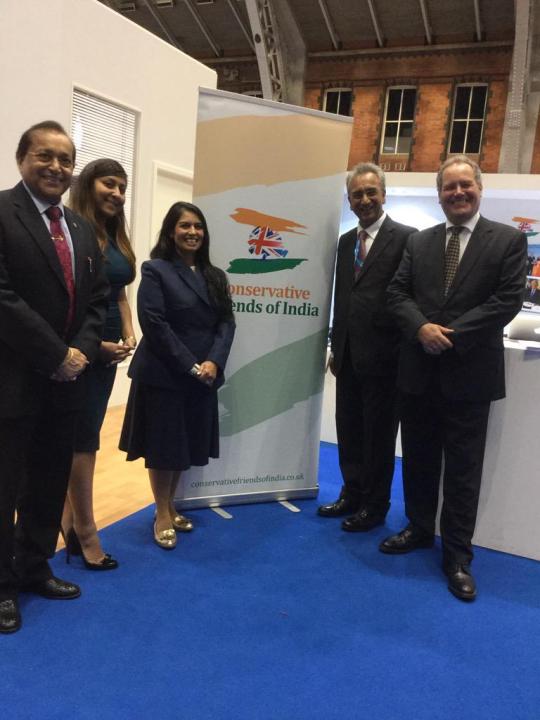
Priti Patel and Lord Dolar Popat, Prism trustee, together at the Conservative Party conference 2015. Patel and Popat are immediately on either side of the banner. Picture: Bob Blackman MP.
LOVE WITHOUT COMMITMENT
In Calais, Choose Love’s managers faced several pressures. They faced new demands for accountability from their funded organisations; some perceived legal risk, however low; and, possibly, political pressure from the Home Office. We don’t know exactly what factors shaped their decision. What we do know is that, as these pressures mounted, they quit their commitment to Calais.
Perhaps that’s hardly surprising. Choose Love and Prism came to dominate the supply of humanitarian funding to Calais almost overnight. This put considerable power over vulnerable people into the hands of two groups of decision-makers. One was Choose Love: a “group of mates” from the London media world, who openly admitted their “naivety”. The other was Prism: a charity manager for the rich, run by investment bankers and a Conservative Lord.
One person who worked with Choose Love reflects: “my first impression when I realised how they worked was that they were ill prepared, just not competent. But then, there is only a certain amount you can justify as lack of preparedness or poor leadership.”
Maybe it wouldn’t matter so much if all people needed in Calais were deliveries of food and other aid. But Calais has never been just a “humanitarian crisis” – if there is ever such a thing. The desperation and death here is a direct result of the border, created by media and politicians, enforced by police and security guards. When even sharing basic sea safety information becomes a political battleground, showing solidarity means being called to make a stand. If standing with refugees means choosing love, that love also requires commitment.
IF YOU WANT TO SEND MONEY TO NORTHERN FRANCE:
Calais Migrant Solidarity / Watch the Channel:
The Calais Migrant Solidarity network has been active in Calais since 2009, practising solidarity not charity. Watch the Channel shares sea safety information and monitors the UK and French authorities “to ensure that the coastguards fulfil their duties under international maritime law to rescue people in distress.” It doesn’t have its own bank account but donations can be sent via CMS.
https://calaismigrantsolidarity.wordpress.com/donate/
Calais Appeal:
Calais Appeal is a group of seven humanitarian aid organisations working in Calais: Calais Food Collective, Collective Aid, Human Rights Observers, Refugee Women’s Centre, Refugee Info Bus, Woodyard and Project Play. They have set up this joint emergency appeal fund after having their funding cut by Choose Love.
https://www.calaisappeal.co.uk/
iThere is a distinction in UK law between giving “immigration advice”, e.g., advising an individual on their specific case, and sharing general “information”. In an email exchange with Choose Love, Watch the Channel pointed this out and asked that Choose Love stop referring to their leaflet as giving “advice”.
"We understand that some civil society organisations in Calais may, as of recently, be carrying out activities (such as, non-exhaustively, creating, distributing and discussing leaflets giving advice on making Channel crossings) which might be regarded as criminal offences under section 25 [of the Immigration Act 1971].”
In an email to Watch the Channel, Nico Sanders of Choose Love wrote: “We can confirm we received legal advice
which we are unable to share in order for it to remain legally privileged.” When we also asked them about the legal advice, they did not respond to the question.
Choose Love’s statement in full: “The decision to end funding for some projects in northern France was not taken lightly. It followed in-depth internal and external reviews into how we carry out our work, and was made to ensure we can continue to achieve positive change for the people we support through the organisations we fund.
“As a result of these reviews, we made the decision to focus funding on two charities working with unaccompanied minors in northern France. We look forward to continuing our work with them to support children and young people. This decision was communicated to partner organisations as early as possible, and grant agreements were in fact extended, to enable those affected to find alternative sources of funding should they require it.
“Our decision was ours and ours alone. All financial decisions are fully audited by Prism the Gift Fund, who oversee Choose Love to provide the highest levels of financial oversight and governance, ensuring we meet the highest regulatory standards, and it is independently audited and fully compliant with the Charity Commission.”
Prism’s responses in full:
“Choose Love is a restricted funds operating under the auspices of Prism the Gift Fund (Prism). Our Trustees oversee all income and expenditure of the Collective, ensuring it operates to the highest regulatory standards. We are therefore fully aware of all decisions taken by Choose Love and fully aware of its projects.
“The decision to focus funding in northern France on two charities supporting unaccompanied minors was a decision made by Choose Love...."
Choose Love, in a nutshell.
4 notes
·
View notes
Text
I messed up and missed a chapter!
20k Leagues under the sea, chapter 16!
CHAPTER XVI
A SUBMARINE FOREST
We had at last arrived on the borders of this forest, doubtless one of the finest of Captain Nemo’s immense domains. He looked upon it as his own, and considered he had the same right over it that the first men had in the first days of the world. And, indeed, who would have disputed with him the possession of this submarine property? What other hardier pioneer would come, hatchet in hand, to cut down the dark copses?
This forest was composed of large tree-plants; and the moment we penetrated under its vast arcades, I was struck by the singular position of their branches—a position I had not yet observed.
Not a herb which carpeted the ground, not a branch which clothed the trees, was either broken or bent, nor did they extend horizontally; all stretched up to the surface of the ocean. Not a filament, not a ribbon, however thin they might be, but kept as straight as a rod of iron. The fuci and llianas grew in rigid perpendicular lines, due to the density of the element which had produced them. Motionless, yet when bent to one side by the hand, they directly resumed their former position. Truly it was the region of perpendicularity!
I soon accustomed myself to this fantastic position, as well as to the comparative darkness which surrounded us. The soil of the forest seemed covered with sharp blocks, difficult to avoid. The submarine flora struck me as being very perfect, and richer even than it would have been in the arctic or tropical zones, where these productions are not so plentiful. But for some minutes I involuntarily confounded the genera, taking zoophytes for hydrophytes, animals for plants; and who would not have been mistaken? The fauna and the flora are too closely allied in this submarine world.
These plants are self-propagated, and the principle of their existence is in the water, which upholds and nourishes them. The greater number, instead of leaves, shot forth blades of capricious shapes, comprised within a scale of colours,—pink, carmine, green, olive, fawn, and brown. I saw there (but not dried up, as our specimens of the Nautilus are) pavonari spread like a fan, as if to catch the breeze; scarlet ceramies, whose laminaries extended their edible shoots of fern-shaped nereocysti, which grow to a height of fifteen feet; clusters of acetabuli, whose stems increase in size upwards; and numbers of other marine plants, all devoid of flowers!
“Curious anomaly, fantastic element!” said an ingenious naturalist, “in which the animal kingdom blossoms, and the vegetable does not!”
Under these numerous shrubs (as large as trees of the temperate zone), and under their damp shadow, were massed together real bushes of living flowers, hedges of zoophytes, on which blossomed some zebrameandrines, with crooked grooves, some yellow caryophylliæ; and, to complete the allusion, the fish-flies flew from branch to branch like a swarm of humming-birds, whilst yellow lepisacomthi, with bristling jaws, dactylopteri, and monocentrides rose at our feet like a flight of snipes.
In about an hour Captain Nemo gave the signal to halt. I, for my part, was not sorry, and we stretched ourselves under an arbour of alariæ, the long thin blades of which stood up like arrows.
This short rest seemed delicious to me; there was nothing wanting but the charm of conversation; but, impossible to speak, impossible to answer, I only put my great copper head to Conseil’s. I saw the worthy fellow’s eyes glistening with delight, and to show his satisfaction, he shook himself in his breastplate of air in the most comical way in the world.
After four hours of this walking I was surprised not to find myself dreadfully hungry. How to account for this state of the stomach I could not tell. But instead I felt an insurmountable desire to sleep, which happens to all divers. And my eyes soon closed behind the thick glasses, and I fell into a heavy slumber, which the movement alone had prevented before. Captain Nemo and his robust companion, stretched in the clear crystal, set us the example.
How long I remained buried in this drowsiness I cannot judge; but, when I woke, the sun seemed sinking towards the horizon. Captain Nemo had already risen, and I was beginning to stretch my limbs, when an unexpected apparition brought me briskly to my feet.
A few steps off, a monstrous sea-spider, about thirty-eight inches high, was watching me with squinting eyes, ready to spring upon me. Though my diver’s dress was thick enough to defend me from the bite of this animal, I could not help shuddering with horror. Conseil and the sailor of the Nautilus awoke at this moment. Captain Nemo pointed out the hideous crustacean, which a blow from the butt end of the gun knocked over, and I saw the horrible claws of the monster writhe in terrible convulsions. This accident reminded me that other animals more to be feared might haunt these obscure depths, against whose attacks my diving-dress would not protect me. I had never thought of it before, but I now resolved to be upon my guard. Indeed, I thought that this halt would mark the termination of our walk; but I was mistaken, for, instead of returning to the Nautilus, Captain Nemo continued his bold excursion. The ground was still on the incline, its declivity seemed to be getting greater, and to be leading us to greater depths. It must have been about three o’clock when we reached a narrow valley, between high perpendicular walls, situated about seventy-five fathoms deep. Thanks to the perfection of our apparatus, we were forty-five fathoms below the limit which nature seems to have imposed on man as to his submarine excursions.
I say seventy-five fathoms, though I had no instrument by which to judge the distance. But I knew that even in the clearest waters the solar rays could not penetrate further. And accordingly the darkness deepened. At ten paces not an object was visible. I was groping my way, when I suddenly saw a brilliant white light. Captain Nemo had just put his electric apparatus into use; his companion did the same, and Conseil and I followed their example. By turning a screw I established a communication between the wire and the spiral glass, and the sea, lit by our four lanterns, was illuminated for a circle of thirty-six yards.
Captain Nemo was still plunging into the dark depths of the forest, whose trees were getting scarcer at every step. I noticed that vegetable life disappeared sooner than animal life. The medusæ had already abandoned the arid soil, from which a great number of animals, zoophytes, articulata, molluscs, and fishes, still obtained sustenance.
As we walked I, thought the light of our Ruhmkorff apparatus could not fail to draw some inhabitant from its dark couch. But if they did approach us, they at least kept at a respectful distance from the hunters. Several times I saw Captain Nemo stop, put his gun to his shoulder, and after some moments drop it and walk on. At last, after about four hours, this marvellous excursion came to an end. A wall of superb rocks, in an imposing mass, rose before us, a heap of gigantic blocks, an enormous, steep granite shore, forming dark grottos, but which presented no practicable slope; it was the prop of the Island of Crespo. It was the earth! Captain Nemo stopped suddenly. A gesture of his brought us all to a halt, and, however desirous I might be to scale the wall, I was obliged to stop. Here ended Captain Nemo’s domains. And he would not go beyond them. Further on was a portion of the globe he might not trample upon.
The return began. Captain Nemo had returned to the head of his little band, directing their course without hesitation. I thought we were not following the same road to return to the Nautilus. The new road was very steep, and consequently very painful. We approached the surface of the sea rapidly. But this return to the upper strata was not so sudden as to cause relief from the pressure too rapidly, which might have produced serious disorder in our organisation, and brought on internal lesions, so fatal to divers. Very soon light reappeared and grew, and the sun being low on the horizon, the refraction edged the different objects with a spectral ring. At ten yards and a half deep, we walked amidst a shoal of little fishes of all kinds, more numerous than the birds of the air, and also more agile; but no aquatic game worthy of a shot had as yet met our gaze, when at that moment I saw the Captain shoulder his gun quickly, and follow a moving object into the shrubs. He fired;—I heard a slight hissing, and a creature fell stunned at some distance from us. It was a magnificent sea-otter, an enhydrus, the only exclusively marine quadruped. This otter was five feet long, and must have been very valuable. Its skin, chestnut-brown above and silvery underneath, would have made one of those beautiful furs so sought after in the Russian and Chinese markets; the fineness and the lustre of its coat would certainly fetch £80. I admired this curious mammal, with its rounded head ornamented with short ears, its round eyes, and white whiskers like those of a cat, with webbed feet and nails, and tufted tail. This precious animal, hunted and tracked by fishermen, has now become very rare, and taken refuge chiefly in the northern parts of the Pacific, or probably its race would soon become extinct.
Captain Nemo’s companion took the beast, threw it over his shoulder, and we continued our journey. For one hour a plain of sand lay stretched before us. Sometimes it rose to within two yards and some inches of the surface of the water. I then saw our image clearly reflected, drawn inversely, and above us appeared an identical group reflecting our movements and our actions; in a word, like us in every point, except that they walked with their heads downward and their feet in the air.
Another effect I noticed, which was the passage of thick clouds which formed and vanished rapidly; but on reflection I understood that these seeming clouds were due to the varying thickness of the reeds at the bottom, and I could even see the fleecy foam which their broken tops multiplied on the water, and the shadows of large birds passing above our heads, whose rapid flight I could discern on the surface of the sea.
On this occasion, I was witness to one of the finest gun-shots which ever made the nerves of a hunter thrill. A large bird of great breadth of wing, clearly visible, approached, hovering over us. Captain Nemo’s companion shouldered his gun and fired, when it was only a few yards above the waves. The creature fell stunned, and the force of its fall brought it within the reach of dexterous hunter’s grasp. It was an albatross of the finest kind.
Our march had not been interrupted by this incident. For two hours we followed these sandy plains, then fields of algæ very disagreeable to cross. Candidly, I could do no more when I saw a glimmer of light, which, for a half mile, broke the darkness of the waters. It was the lantern of the Nautilus. Before twenty minutes were over we should be on board, and I should be able to breathe with ease, for it seemed that my reservoir supplied air very deficient in oxygen. But I did not reckon on an accidental meeting, which delayed our arrival for some time.
I had remained some steps behind, when I presently saw Captain Nemo coming hurriedly towards me. With his strong hand he bent me to the ground, his companion doing the same to Conseil. At first I knew not what to think of this sudden attack, but I was soon reassured by seeing the Captain lie down beside me, and remain immovable.
I was stretched on the ground, just under the shelter of a bush of algæ, when, raising my head, I saw some enormous mass, casting phosphorescent gleams, pass blusteringly by.
My blood froze in my veins as I recognised two formidable sharks which threatened us. It was a couple of tintoreas, terrible creatures, with enormous tails and a dull glassy stare, the phosphorescent matter ejected from holes pierced around the muzzle. Monstrous brutes! which would crush a whole man in their iron jaws. I did not know whether Conseil stopped to classify them; for my part, I noticed their silver bellies, and their huge mouths bristling with teeth, from a very unscientific point of view, and more as a possible victim than as a naturalist.
Happily the voracious creatures do not see well. They passed without seeing us, brushing us with their brownish fins, and we escaped by a miracle from a danger certainly greater than meeting a tiger full-face in the forest. Half an hour after, guided by the electric light, we reached the Nautilus. The outside door had been left open, and Captain Nemo closed it as soon as we had entered the first cell. He then pressed a knob. I heard the pumps working in the midst of the vessel, I felt the water sinking from around me, and in a few moments the cell was entirely empty. The inside door then opened, and we entered the vestry.
There our diving-dress was taken off, not without some trouble; and, fairly worn out from want of food and sleep. I returned to my room, in great wonder at this surprising excursion at the bottom of the sea.
0 notes
Text
Another great picture from Noel’s 50th birthday party. Noel’s mum and dad looking great in the front row.
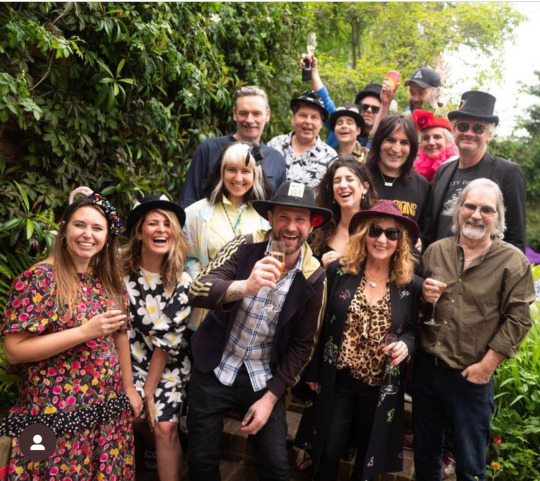
#noel fielding#the mighty boosh#dianne fielding#lliana bird#rich fulcher#julian barratt#mike fielding#dave brown#ray fielding
132 notes
·
View notes
Link
0 notes
Text
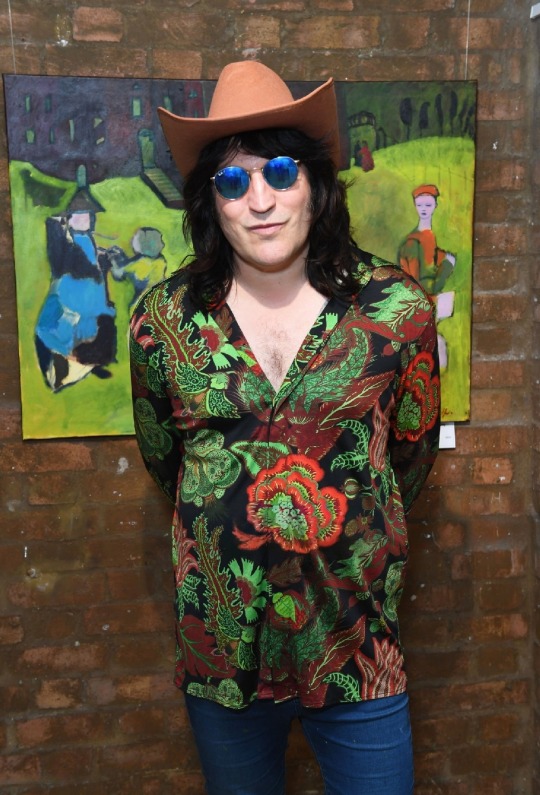
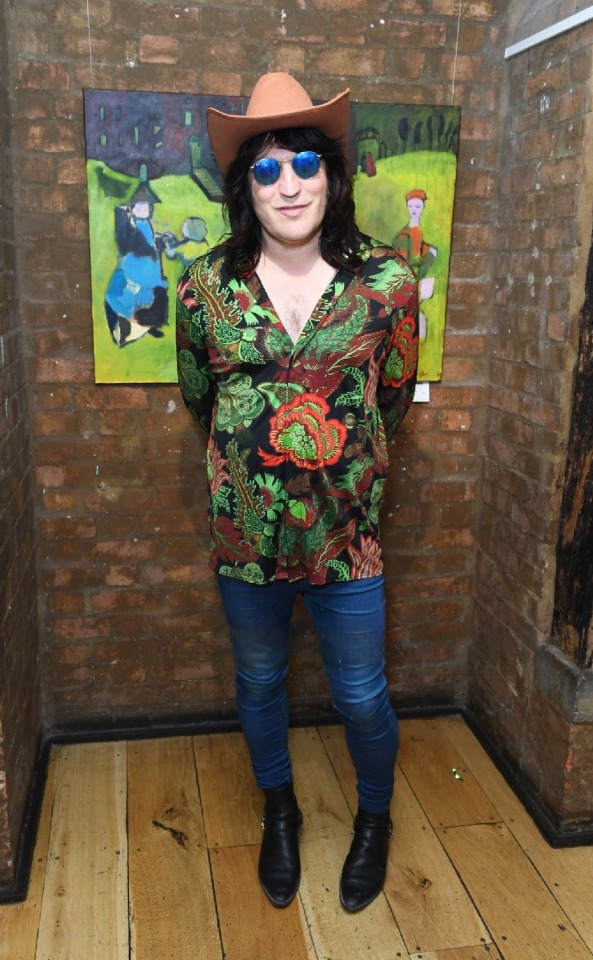
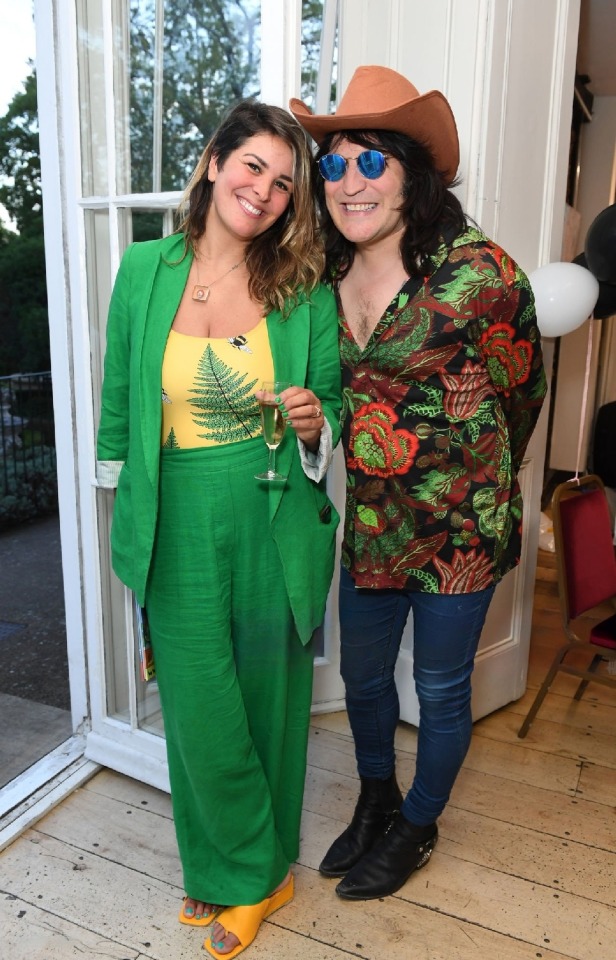

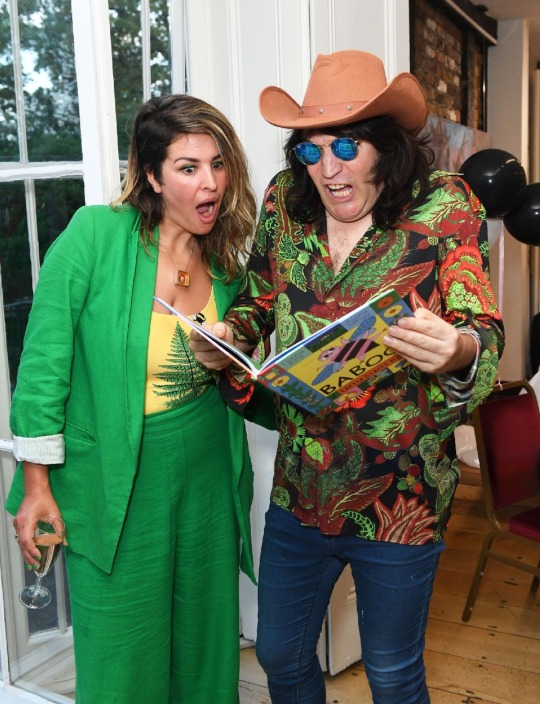
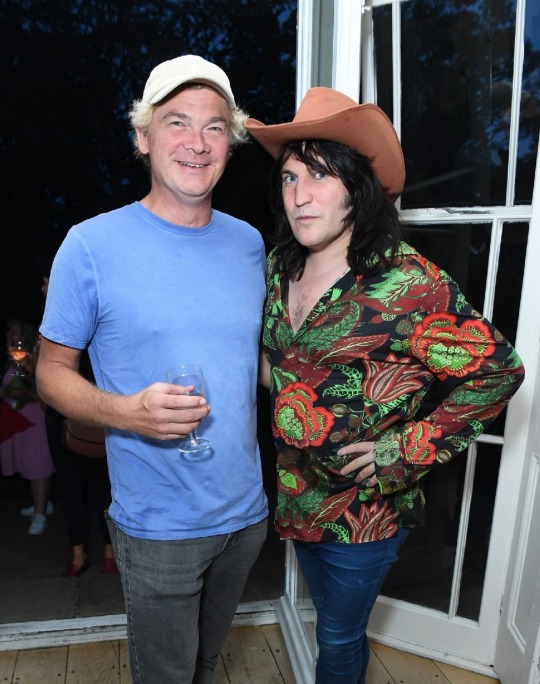
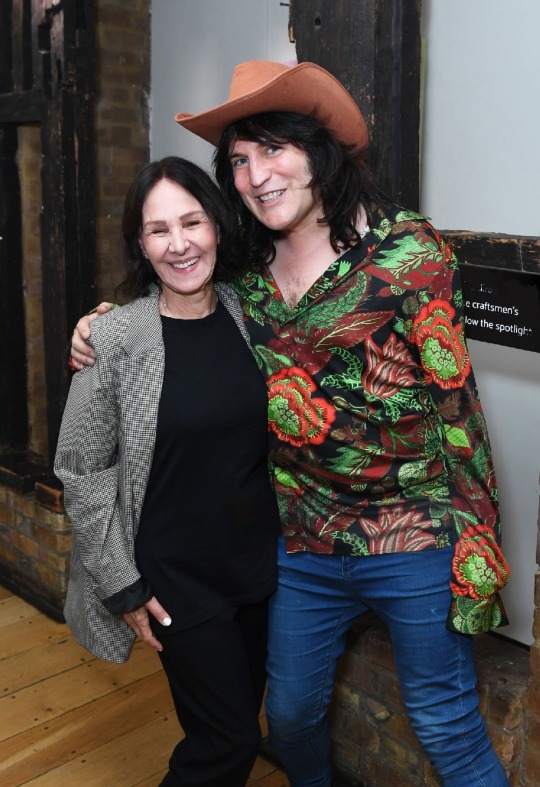
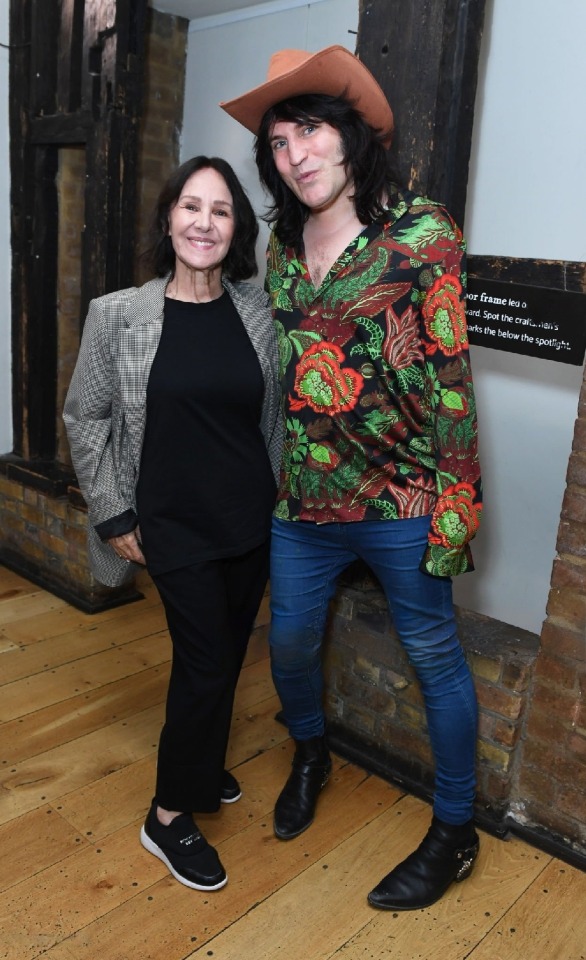

Unwatermarked photos from presentation Birdy's book for the children
"Baboo The Unusual Bee" By Lliana Bird & Aysha Tengiz 14/09/2023
As Noel and Lliana against to show their daughters' faces, they were hidden under the bees.
48 notes
·
View notes
Photo
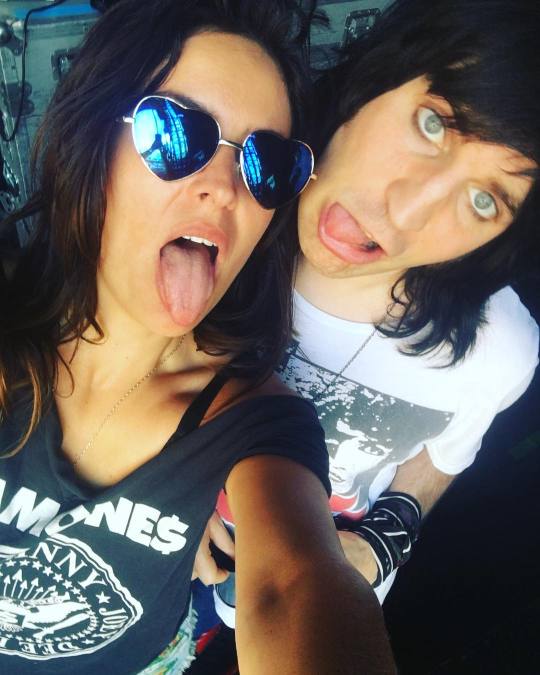
[x]
#Noel Fielding#Noeledit#Lliana Bird#Noeliana#People#Photos#Beautiful People#Beautiful Photos#HD Photos#Stylish Photos#Fashion People#British People#British Comedy#British Comedians#British TV#British TV Shows#British Celebrities#Celebrities
12 notes
·
View notes
Text


from @rachelmoule and @luciespecialeon Instagram ✨
32 notes
·
View notes

